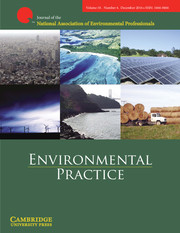No CrossRef data available.
Article contents
The “Hierarchy of Needs” Screening Process: A Method for Rapid Development and Rationalization of Reasonable Alternatives
Published online by Cambridge University Press: 31 January 2007
Extract
Nearly two decades ago, the United States Army began implementation of a method for developing and analyzing reasonable alternatives, as per the requirements of the National Environmental Policy Act (NEPA). The method was developed collaboratively by the Army's planners (including the authors) and environmental advocates in response to the needs for expeditious decision making (for the operational planners) and statutory compliance (for the environmental aspects). Fundamentally, the method painted a picture of the desired outcome in terms of quantifiable attributes (what should the end result ideally look like?). It then compared every possible alternative against those attributes, through a series of screening operations (will these alternatives, if selected, produce success?). Those alternatives remaining after the screening became the reasonable alternatives; these were the only alternatives that could produce successful outcomes if chosen. The method, initially developed for the stationing of Army units and often referred to as the “Hierarchy of Needs” screening process, is quick, understandable, and—most importantly—allows the rationalization of the decision-making process. Our article presents an overview of this novel process, which is well suited for dealing with a continuing problem facing federal agencies today—that of developing reasonable alternatives and rationalizing the outcomes for all stakeholders.
- Type
- NEWS & INFORMATION
- Information
- Copyright
- © 2006 National Association of Environmental Professionals




